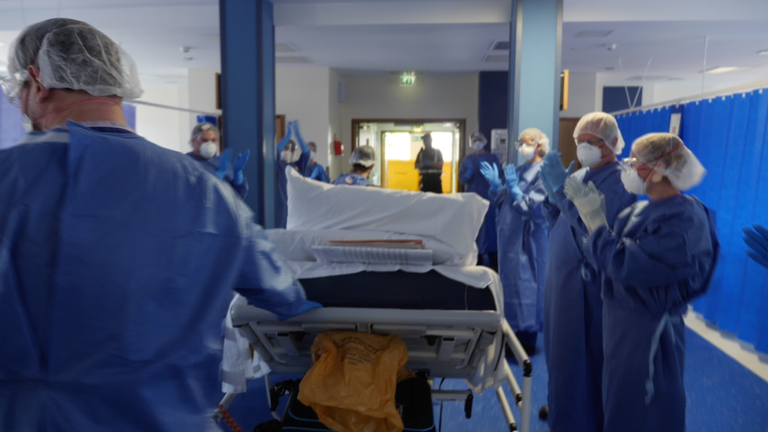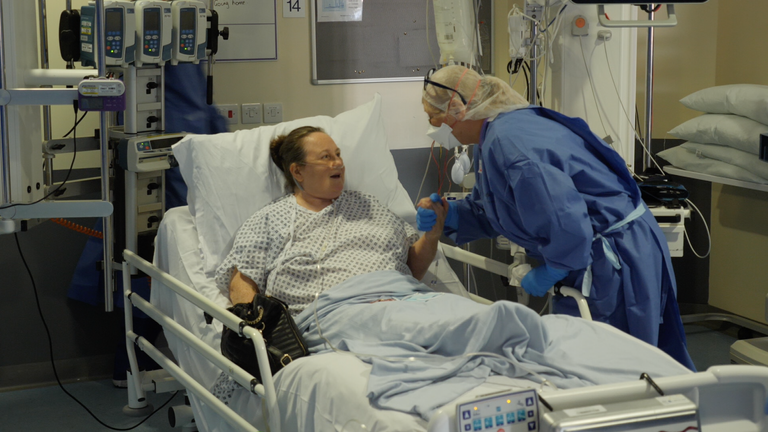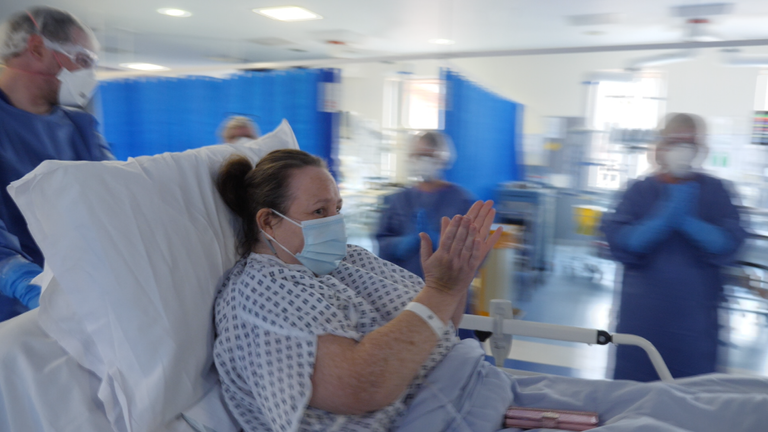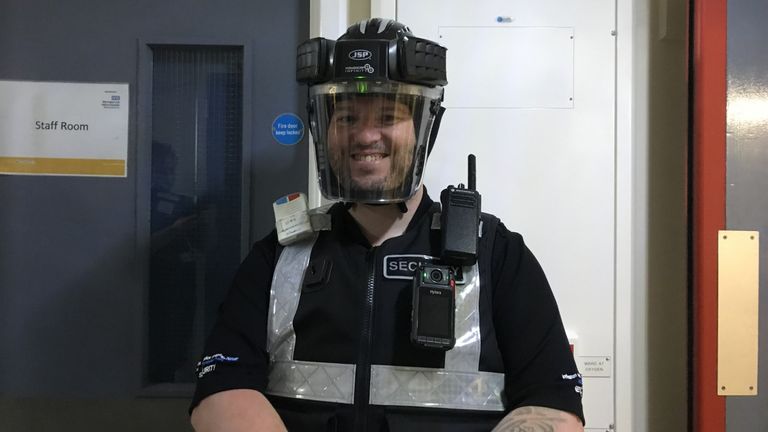There's a cheery voice cutting through the whirr of machine noises in Warrington Hospital ICU.
It's Donna Wall. The last time we saw her, she had been clinging to life, fighting for every breath.
"Hello Alex!" she calls out. Certainly, it's a dramatic change.
Now, any voice in ICU is pretty unusual. These are the most seriously ill patients requiring 24-hour care, who are often on life support.
You certainly don't expect a jolly salutation from any of the patients in there.
Advertisement
The medical teams all around the unit are creating a background hum of quietly spoken messages and communications, made through plastic visors and face masks shielding them from the deadly virus.
The patients all around Donna are silent, aside from the occasional moan.
More from Covid-19
There are several awake but quiet. Some are on ventilators. Others are being tended to by physios or having their vital signs checked on monitors.
Donna is sitting, propped up by pillows in her intensive care bed, her hair washed and cleaned, looking through the messages on her phone.
It's just days after she was featured in a Sky News report and she told us: "I don't want to be a statistic".
She has two boys at home – four-year-old Frankie and 13-year-old Charlie.
Since we last saw her, she's had messages from friends and family as well as school pals she hasn't heard from in years.
"Apparently Piers Morgan tweeted about me," she tells us cheerily, "And someone called Andy Burnham?"
Andy Burnham is the former Labour health secretary from 2009 to 2010, now mayor of Greater Manchester.
"It's been amazing. I feel so much better," she says.
The ICU team tells us she's been asking where the Sky News team is. "I want to show them how much better I am," she tells them.
And she is.
:: Listen to the Daily podcast on Apple Podcasts, Google Podcasts, Spotify, Spreaker
"You know, I'm getting there," she goes on, "My smell's coming back, my taste's coming back…my appetite's coming back….I'm feeling great."
She says a young nurse called Duncan had helped her wash her hair that morning.
She's now needing a lot less oxygen help, using her specially adapted 'black box' which does the same job as a CPAP machine (Continuous Positive Airway Pressure).
This is where the airways of the lungs are kept open by pumping oxygen into them through a tightly-fitted face mask.
Donna puts her astonishingly rapid recovery down to the ingenuity of hospital medical teams, which we reported on last week.
"They kept me off a ventilator," she says in her soft disarming voice, "I really didn't want to go on a ventilator."
Not sure anyone would blame her for that.

The mortality rates for those put on a ventilator are frighteningly high – sometimes more than 50%.
In Donna's case, the teams at Warrington collaborated to modify and adapt a black box normally used to treat sleep apnoea. They fitted it with a more sophisticated face mask and oxygen and in doing so, replicated the Rolls Royce-hospital CPAP version.
Certainly, Donna believes she owes her life to the skill, dedication and creative-thinking of the teams at Warrington.
"I think it's marvellous what they've come up with: the idea… it's absolutely amazing to stop people from going onto ventilators so much and to get a more positive outcome," she says.
The innovative way the hospital has used its resources – "thinking out of the box about a black box", as one put it, has prompted a deluge of calls and emails from medics and clinicians around the world.
Doctors in New York have written to the hospital asking to collaborate and pool ideas; the Mercedes F1 design team have been in touch inquiring if they can help by creating similar devices or just making more of them.
And medical teams around Britain have lent their support – and have come up with their own suggestions on coping with COVID-19.
The pandemic has brought all of us together in a way perhaps only a true crisis can.
Whilst we're with Donna, nurse Lesley Howlett comes up to tell her she's being moved out of ICU to the next "step down" to the less intensive level of care. She'll continue to be monitored.

The ward is reserved for COVID-19 patients who are just out of intensive care or those whom the medical teams are trying to prevent going into the unit.
It means Donna's vital stats are showing she is improving. It's one step closer to her leaving hospital altogether and going home to her two boys.
She is delighted. She really didn't think she'd make it.
"I was so scared…I just thought: 'I might die'."
For the first time, her face is creased in pain and her lips are quivering. She's trying hard not to cry but the memory is raw and painful as she realises how close she came to losing everything she values.
"But I'm not going to cry," she tells us, "Because they've looked after me here so well…they've really done their best and nothing's been any trouble…they've explained everything to me and I'm thankful to each and every one of them.
"I'm never going to take anything for granted again," she says.
"I just can't wait to get back to my family and give my boys a hug. I'm even looking forward to getting back to work, and I never thought I'd say that."
She's wheeled out of ICU, guarded by the hospital's 'Covid cops' – security guards more used to patrolling the car parks and dealing with inebriated partygoers in the days before coronavirus.

Like so many others, their jobs have changed substantially.
They now play a key role in transferring Covid patients safely through the hospital – whilst keeping the rest of the hospital safe from infection.
This involves barricading corridors and locking down routes whilst the coronavirus patient is taken as quickly as possible to their destination.
One of the Covid cops, Richard Fishwick, beamed with pride as he told us: "I love this. I'm getting involved and helping out and it's a pleasure to do this for the NHS."

[contf]
[contfnew]

sky news
[contfnewc]
[contfnewc]





